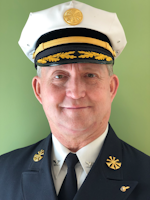Motivation is the force of desire or willingness of someone to do something. Dwight D. Eisenhower stated that motivation is the art of getting people to do what you want them to do because they want to do it.
The word motivation derives from the Latin term motivus (“a moving cause”), which suggests that the activating properties of the process involve psychological forces that act either on or within a person to initiate behavior. Primary motives include hunger, avoidance of pain, aggression and fear. Secondary motives include achievement, praise, recognition and power. In today’s stressful EMS practices and responses, motivating personnel is a difficult task but requires a significant ongoing interest.
Desire and commitment
Phil Jackson, who was an NBA coach who won 11 titles, once said, “You cannot motivate someone. All you can do is provide a motivating environment, and the players will motivate themselves.” EMS supervisors are like the coaches of the EMS team. They must create a motivating environment. If personnel lack performance, putting pressure on them can worsen the situation, because the underlying problem(s) might never get addressed.
Although managers are mandated to question when performance is deficient, they first must ascertain how difficult the assigned task or skill is, how capable an individual is, and whether training and resources to do the job are implemented and accessible. Furthermore, if performance is deficient, then management must look at possible motivational issues. Improve weakness through excellent coaching skills as well as education, and shy away from counseling.
Desire and commitment directly motivate. Both are affected by internal as well as external forces. Internally, a provider must have passion and commitment to his/her job and performance. Externally, an organization must encourage engagement and reinforce desire by rewarding performance. If management demonstrates a commitment to the organization and to personnel, then the providers, in return, will be committed. Honest and timely feedback is essential.
Empower everyone in the organization, allowing them to help to establish the goals and mission, achieving improved performance and outcome. The organization then will deliver a supportive work environment through all personnel.
Everyone from the new kid to the seasoned provider has strengths and weaknesses. Good managers understand this by utilizing an individual’s strengths to help another’s weaknesses, assigning tasks suitable for each provider. Every organization also needs to establish a culture of learning and mentoring. Training is one of the essential tools that an organization can give to its providers. Supplying the education, resources and time to achieve goals benefits all. It is a win-win scenario.
George S. Patton believed in “Don’t tell people how to do things, tell them what to do and let them surprise you with their results.” Utilizing this process many times throughout my career in EMS, I always ended up with the right product.
Key management skill
The Four “R’s” to remember to inspire motivation are Respect, Recognize, Responsibility and Reward. Providers are the most valuable and powerful resource that you have. Giving them respect goes a long way. Managers must be respectful to be respected.
Recognize that everyone has ideas and wants to be a part of the solution, so empower them to improve your goals. Make sure that everybody understands the organization’s mission and educate and mentor everyone in all aspects of EMS.
All providers need responsibility, whether it’s a small daily task or a large project. Establish ownership to make these people feel that they are essential and part of the team.
Recognizing a provider’s efforts shouldn’t go unnoticed, giving positive reinforcement and rewarding often. Rewards can come in many forms and don’t need to be monetary.
Motivation isn’t a natural management skill, but its efforts are rewarding. Motivating providers starts by motivating yourself, the supervisor. EMS managers must lead by example and mentor everybody to allow them to achieve higher potentials.
Support a team concept by which everyone is involved in the decision-making process. Empower all providers by giving them the authority to make and implement goals and tasks.
Supporting provider motivation is a process, not a task, that’s endorsed through organizational policies and procedures. Redirect, instead of using discipline, to control hostile behavior. Without motivation and progress, improvement, achievement and success have no meaning.

Richard Bossert
Richard Bossert is a retired operations chief for the Philadelphia Fire Department. He started in the fire/rescue services in 1970, volunteering for the Warminster, PA, Fire Department. He worked for three career fire departments: Chester, Bensalem and Philadelphia. Bossert became a certified EMT in 1973, then paramedic in 1980. He received a bachelor’s degree in pre-med from Pennsylvania State University in 1977 and a master’s degree in public safety administration from St. Joseph’s University in 2003.






